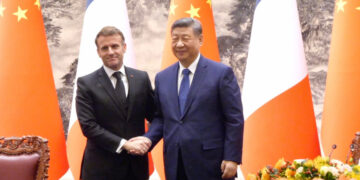Is populism a threat to democracy or a force for democratisation? Yaprak Gürsoy and Toygar Sinan Baykan argue populism can best be conceived of as a “frenemy” of democracy with the potential to both revitalise electoral politics and erode liberal democratic institutions.
Is populism a danger to democracy that threatens its core norms and institutions, or is it a potential democratiser by giving a voice to underrepresented people? In a recent study, we have tackled this question by reviewing the existing academic literature and considering historical experiences with populism and waves of democratic reversal.
We argue that the relationship between populism and democracy is complex. Our proposal is that we should think of populism as both a friend and an enemy – a “frenemy” – of democracy.
Why “frenemy” and why now?
Populism is a friend of democracy because it is intrinsically linked to the idea of popular representation; yet it is also an enemy, as it tends to erode liberal institutions and norms when given the opportunity.
This dual understanding is not entirely new. It echoes Chantal Mouffe’s notion of “agonistic politics” and reflects Cas Mudde and Cristóbal Rovira Kaltwasser’s framing of populism as both a “corrective” and a “threat” to democracy.
While we align with these perspectives, we believe it is especially important to underline that populism is not merely a threat in this particular juncture in global politics and in light of renewed interest in populism following Donald Trump’s re-election in the United States. Populist leaders, parties or movements mobilise excluded groups, challenge entrenched elites in liberal democratic settings and at times create openings for political participation even within authoritarian regimes.
Understanding populism as a frenemy is crucial because how we interpret its nature directly shapes the strategies we adopt to defend democracy. If populism is viewed solely as an archenemy, it invites confrontational electoral and extra-electoral responses.
Yet, as Rovira Kaltwasser warns, “fighting fire with fire” rarely yields effective results. By contrast, recognising populism as a frenemy allows us to see it not just as a threat but also as a symptom, like a fever, that signals underlying democratic ills and vulnerabilities. In this view, populism can be managed through inclusive coalitions and thoughtful policy reforms that mitigate its more radical expressions while preserving democratic engagement.
Populism as a mode of political linkage
Shaping our perspective is a more complex definition of populism, one that goes beyond viewing it solely as an ideology that appeals to ordinary “people” by highlighting injustices committed by a real or imagined “elite”. We also conceptualise populism as a mode of political linkage between leaders, parties and citizens. This mode relies on personalistic leadership, clientelism and informal practices to gain access to and exercise political power.
As many scholars have rightly cautioned, we acknowledge that populism can pose a serious threat to democracy. Populist leaders, particularly those who remain in power for extended periods, often undermine liberal institutions such as the judiciary, the media and opposition parties, and often exhibit increasingly autocratic tendencies.
They tend to polarise society through an “us-versus-them” narrative, rejecting pluralism as a democratic norm. Personalistic leadership, coupled with populism, views elections not as a contest between competing visions, but as a confirmation of a pre-existing general will, making it difficult to accept electoral defeat. These dangers are especially pronounced in countries where democratic institutions and norms are already fragile or underdeveloped, paving the way for autocratisation, especially through personalism.
However, populism, as a mode of political linkage between leaders and citizens, also carries democratic potential. In the 1930s, populist leaders, parties and movements expanded the franchise across parts of Latin America, offering underprivileged groups a sense of inclusion and dignity. Populist practices such as mass clientelism supported democratic transitions in Southern Europe and particularly in Greece during the 1980s, by incorporating previously excluded populations into emerging democratic regimes through material incentives.
Even in their more radical forms in contemporary Europe, whether on the right or the left, populist actors have contributed to the revitalisation of democratic politics. They have brought issues such as immigration and neoliberal economic policies back onto the public agenda, mobilised citizens alienated by the policy convergence of mainstream parties and re-politicised public discourse. In doing so, populism has made electoral processes more engaging for broader segments of the population and energised political participation.
Populism in an age of democratic erosion
If populism can act as a democratiser, how should we interpret its role in the current wave of autocratisation? Populist movements, parties and leaders are clearly dissatisfied with the institutional complexity, high levels of mediation and perceived unresponsiveness of liberal democratic systems. As such, they have certainly contributed to the reverse trend.
However, adopting a long-term global perspective reveals that the incremental nature of contemporary democratic backsliding has, so far, not dismantled some of democracy’s core pillars, most notably elections and party competition. From a historically comparative standpoint, it is important to remember that populism does not seek to abolish democracy in the way autocratic forces did in interwar Europe. Such an outcome would ultimately result in elite control, which populists, in principle, do not desire.
With its emphasis on popular sovereignty and the centrality of ordinary people’s voices in politics, populism underscores that democracy should not be a regime in which large majorities are excluded, either de jure or de facto. Contemporary democracies must be responsive to the demands of the majority and attuned to how populism often brings together coalitions of diverse groups, including different social classes and ethnic communities, in shaping the notion of “the people”.
When analyses focus solely on populism’s conflictual “us-versus-them” dynamic, they risk overlooking the more pluralistic and tolerant dimensions that may exist inside populist movements, which are not immediately visible from the outside.
Populism’s dual role as a frenemy of democracy demands a more comprehensive understanding: one that avoids simplistic condemnation and instead seeks strategies for democratic resilience and renewal, informed by the lessons populism itself offers.
For more information, see the authors’ recent study in Democratization.
Note: This article gives the views of the authors, not the position of EUROPP – European Politics and Policy or the London School of Economics. Featured image credit: CC7 / Shutterstock.com






































Discussion about this post